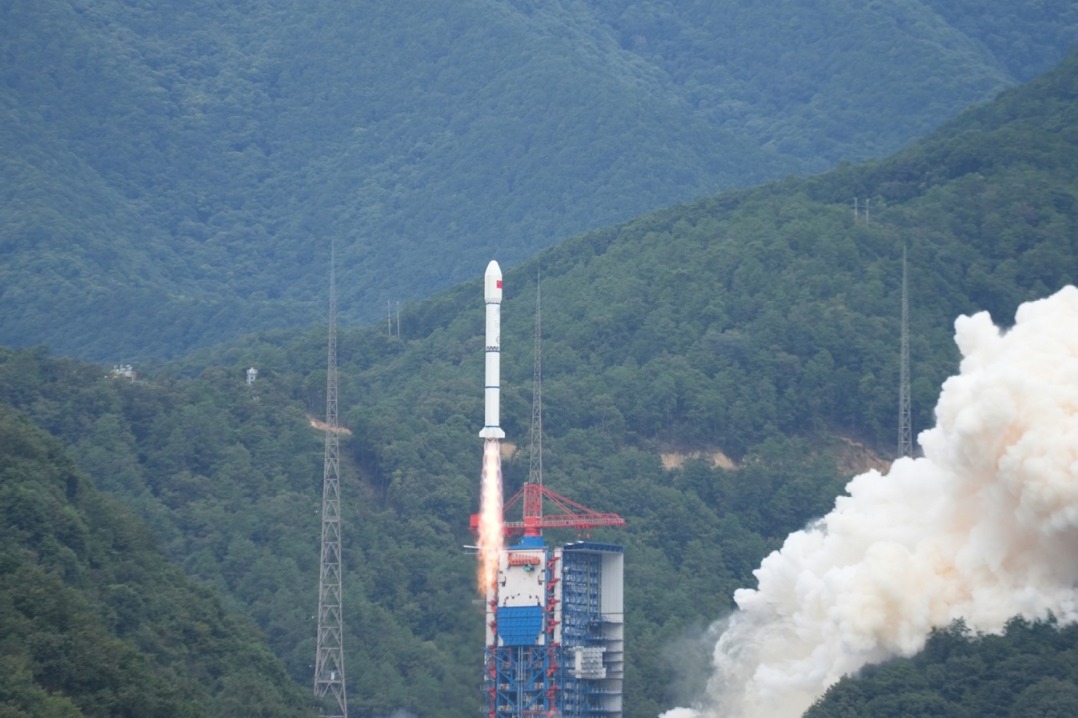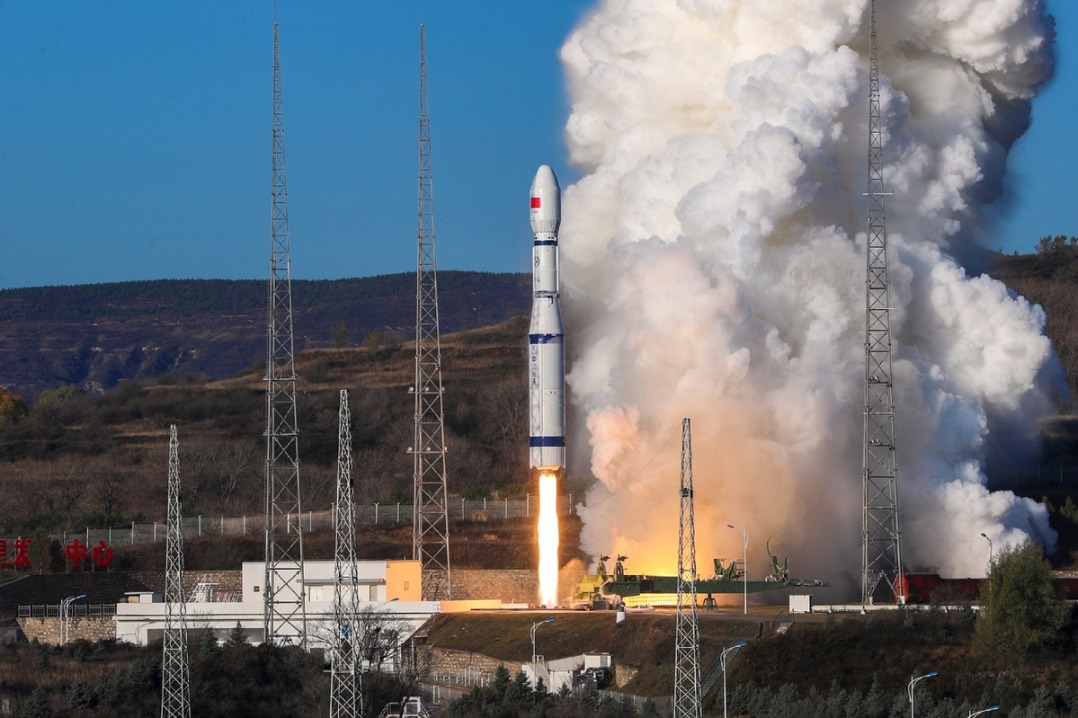China to the world: We're open for business

Investment growing easier, especially for participants of Belt and Road Initiative, Ren Xiaojin and Jing Shuiyu report.
China's efforts to ease market access for foreign investors and build a level playing field for all types of businesses at home and abroad have yielded fruitful results.
The country's trade and investment are expected to continue experiencing solid and steady expansion by channeling more resources into China's supply-side structural reform and by boosting the momentum generated by the Belt and Road Initiative, experts said.
Foreign direct investment into the Chinese mainland has registered steady growth during the past five years, with a great deal of money flowing into the high-technology and service industries.
For instance, FDI flowing into financial intermediaries such as commercial and investment banks increased by 3.9 times from 2012 to 2016, while foreign capital flowing into the information transmission, computer services and software sector expanded by 1.5 times, according to the National Bureau of Statistics.
The substantial rise in FDI points to the country's efforts to improve the overall business environment, said Wei Jianguo, vice-president of the China Center for International Economic Exchanges.
In 2018, FDI into the Chinese mainland is expected to see double-digit growth, buoyed by the country's forthcoming round of high-level opening-up measures following vows from the top leadership in recent months to further ease access to the world's second-largest economy by the outside world, Wei said.
China's outbound direct investment, after peaking in 2016, went through a drastic reduction in 2017 amid the central government's efforts to curb irrational investments overseas that bring potential risks to overall financial security.
Official data show that stringent controls have reined in irrational outbound investment, especially in some key sectors.
Since the country proposed the Belt and Road Initiative in 2013, business ties between China and countries and regions involved in the Silk Road Economic Belt and the 21st Century Maritime Silk Road have improved.
Last year, Chinese enterprises signed 7,217 infrastructure construction and other commercial contracts with 61 countries involved in the initiative with a value of $144.32 billion, up by 14.5 percent year-on-year. Those account for 54.4 percent of the value of all such deals in overseas markets, according to the Ministry of Commerce. In 2015, the value of such contracts was $92.64 billion. Revenue from completed projects in countries involved in the initiative also continued to increase steadily in the past three years.
Foreign direct investment
FDI into the Chinese mainland has grown steadily over the past five years, from $117.6 billion in 2013 to $131 billion in 2017. One notable trend is that more capital has flowed into the country's growing services and high-tech sectors, particularly finance, education, health, social security, social welfare and computer science.
According to data from the National Bureau of Statistics, FDI into traditional industries declined significantly between 2012 and 2016. FDI entering the mining sector has dropped from $770 million to $96 million during the same period, down 87.5 percent. FDI into the agriculture, forestry, animal husbandry and fishery sectors has decreased by 8 percent. Foreign capital flow into the manufacturing sector also has gone from $48.9 billion to $35.5 billion in that period, a decline of 27.4 percent.
In sharp contrast with traditional industries, the services and high-tech sectors have gained increasing attention from foreign investors.
In that period, foreign capital to China's financial sector has risen almost fourfold, from $2.1 billion to $10.3 billion. FDI into the health, social security and social welfare areas tripled.
To attract more foreign capital inflows, the country has released a number of policies to implement new regulations, such as granting foreign companies national treatment and devising a negative list management system, as Zhong Shan, minister of commerce, emphasized during the ongoing annual session of the nation's top legislature, the 13th National People's Congress.
"To create a fair business climate, the ministry will continue to push forward the legislation on the management of foreign investment and treat foreign companies as equals to domestic ones," he said.
He said the country will further open its economy to foreign investors in sectors such as finance, general manufacturing and services.
"A new wave of reform and opening-up measures that the Chinese government has been researching this year will exceed international expectations. The policy of attracting foreign investment, in particular, will achieve a breakthrough," Wei, from the China Center for International Economic Exchanges, said.
Outbound direct investment
China's ODI in the high-tech and service industries had substantial growth from 2012 to 2016.
According to the National Bureau of Statistics, ODI into the health and social services sector increased by 90 times, from $5.38 million in 2012 to $487.19 million in 2016. Management of water conservancy, environment and public facilities climbed by 24 times. By contrast, ODI in the mining industry shrank by 85.7 percent in that period.
As a growing number of Chinese companies rush to invest overseas, the Chinese government raised concerns about the abnormal capital out-flow that could disrupt normal financial order.
Beginning in late 2016, the government has applied tighter supervision on Chinese companies' outbound investment activities, especially in areas like property, hotels and entertainment.
Several months later, unrestricted overseas investment was largely brought under control, official data showed. ODI increased by 34.6 percent year-on-year to $196.1 billion in 2016. But a year later, the figure was $120.1 billion, according to the National Bureau of Statistics.
In particular, the number of overseas merger and acquisition deals in the media and entertainment industry declined by more than half in the past year, according to data compiled by Reuters, China Venture and PwC, also known as PricewaterhouseCoopers.
By contrast, high-tech is the most active sector, with the number of such deals climbing by 18 percent year-on-year to 176 in 2017, the data show.
China continues to urge competent companies with reputations to expand their businesses in international markets while cautioning them to become more able to cope with risks, Zhong, the commerce minister, said at a news conference during the 13th NPC.
The country will continue to control what it deems irrational investment and require enterprises that make overseas investment to comply with local laws and regulations, Zhong said.
Overseas projects
Trade volume between China and economies involved in the Belt and Road Initiative climbed sharply from 2015 to 2017, from 5.94 trillion yuan to 7.4 trillion yuan ($940 billion to $1.2 trillion), according to the Ministry of Commerce.
Over the past three years, the number of newly established companies and enterprises in China increased by 78 percent as a result of direct investment from countries involved in the initiative, according to the National Bureau of Statistics.
Investment and merger and acquisition activities by Chinese enterprises in countries and regions involved in the initiative also have increased. According to PwC's report, from 2016 to 2017, the number of overseas merger and acquisition deals conducted by Chinese companies in the related economies has increased about sixfold from 22 to 135, with transaction values soaring from $2 billion to $21.4 billion.
The report forecast that in 2018, Chinese companies will continue to acquire businesses in the countries and regions involved in the initiative.
For example, China Merchants Port Holdings, a subsidiary of China Merchants Group, completed the acquisition of the second-largest container terminal in Brazil for $924 million in February.
"The centrally administrated State-owned enterprises are actively responding to the country's call to support the Belt and Road Initiative and have achieved tangible outcomes from the process," said Xiao Yaqing, the head of the State-Owned Assets Supervision and Administration Commission, who spoke with reporters on the sidelines of the first session of the 13th NPC.
"The initiative has provided many opportunities for countries and regions involved in the Belt and Road Initiative and the country will also open its economy to them," he said.
Contact the writers at jingshuiyu@chinadaily.com.cn
- Survey reveals strong approval for Chinese NGO programs abroad
- China's Xizang spends heavily on cultural tourism development
- China's dark energy detector granted SKA pathfinder status
- Xi highlights BRICS' role in driving multipolarity, globalization ahead of Kazan Summit
- Mainland official meets with Taiwan cultural circle personages in Beijing
- Senior Chinese military official urges for new military training system





































